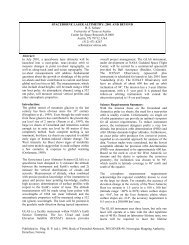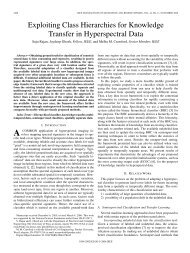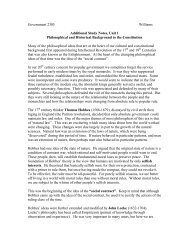Unit 3 Lecture Notes (PDF format)
Unit 3 Lecture Notes (PDF format)
Unit 3 Lecture Notes (PDF format)
- No tags were found...
You also want an ePaper? Increase the reach of your titles
YUMPU automatically turns print PDFs into web optimized ePapers that Google loves.
7) Elected officials, primarily the executive branch, frequently<br />
reorganize agencies in an attempt to make them more accountable to<br />
the legislative process.<br />
Big government came about from a variety of factors. Among these are:<br />
1) The Industrial Revolution. The mechanization of farms and ranches and<br />
the technological revolution led to the urbanization of the nation.<br />
2) The combination of a pseudo-laissez-faire business philosophy and<br />
Social Darwinism eventually produced the conditions that led to an<br />
unpredictable boom-and-bust economy and widespread poverty.<br />
3) Political developments emanating from these economic problems led<br />
eventually to national government intervention in an attempt to curb the<br />
worst excesses of big business and to protect those who were unable to<br />
protect themselves.<br />
The first bureaucratic agency created to protect groups was the Interstate<br />
Commerce Commission (ICC) which was created in 1887 to regulate<br />
railroads, which had been pricing small farmers out of business by charging<br />
exorbitant freight rates.<br />
The scope of government continued to expand after World War II primarily<br />
as the increasing complexity of society also created a need for governmental<br />
expansion. With the demand for new services and rapid population growth<br />
the size and scope of state and local government also increased.<br />
The election of Ronald Reagan in 1980 signaled major political and<br />
ideological changes. The role of states in the American federal system was<br />
increased dramatically. Cuts in federal funding forced reductions in state<br />
and local social programs previously financed by the national government.<br />
Citizens began to question the high cost of governmental services and to<br />
demand more accountability from the administrative state.<br />
Bureaucrats seek first survival and then growth for three basic reasons:<br />
1) To protect their jobs.<br />
2) To promote their organization’s programs.<br />
3) To serve their clientele.<br />
Clientele groups are the groups that are supposed to be regulated by the<br />
bureaucratic agency. Regulation frequently becomes promotion as the<br />
relationship between the two matures.











